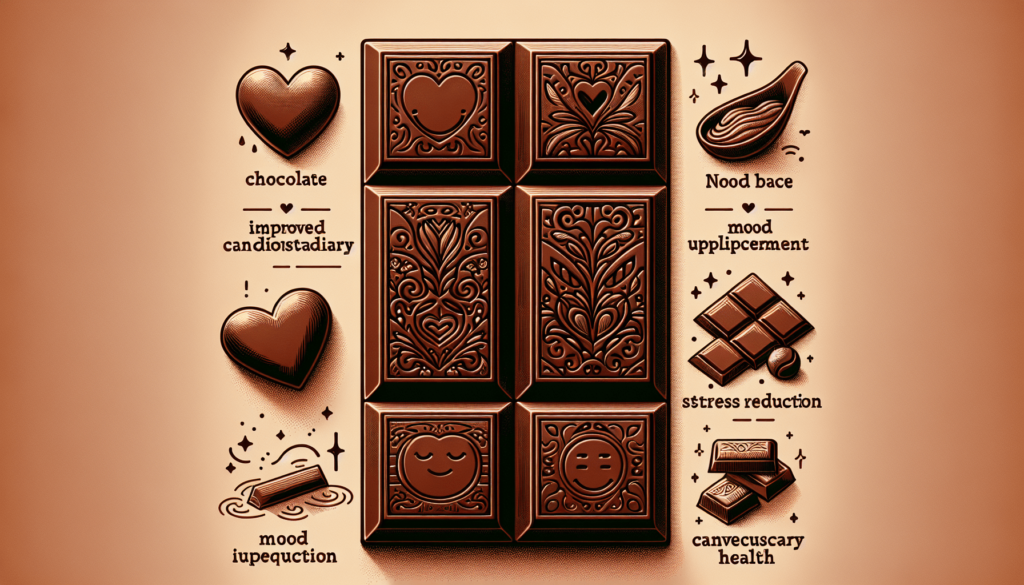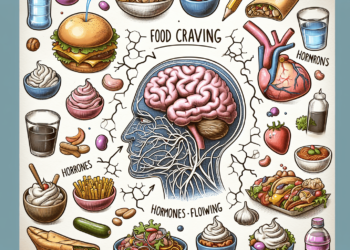Do you have a sweet tooth? Well, you’re in for a treat because we’re about to reveal the 10 amazing benefits of indulging in chocolate. From boosting your mood to improving heart health, chocolate has a surprising array of advantages that you may not be aware of. So get ready to discover the delightful reasons why chocolate should be a part of your daily routine.

Cardiovascular Health
Improved Blood Flow
Eating chocolate can have positive effects on your cardiovascular health, particularly by improving blood flow throughout your body. The flavonoids present in chocolate, especially dark chocolate, have been found to promote the expansion of blood vessels, allowing for better circulation. This improved blood flow can have numerous benefits, such as reducing the risk of blood clots and improving the delivery of oxygen and nutrients to your organs and tissues.
Reduced Risk of Heart Disease
Regular consumption of chocolate has been associated with a reduced risk of heart disease. Several studies have found that the flavonoids in chocolate can have a protective effect on the heart by reducing inflammation, improving blood vessel function, and lowering the risk of blood clots and plaque buildup in the arteries. These benefits, coupled with the cardiovascular benefits of improved blood flow, make chocolate a delicious way to promote heart health.
Lowered Blood Pressure
High blood pressure can strain your heart and increase the risk of heart disease. Fortunately, chocolate may help to lower your blood pressure. The flavonoids found in chocolate, especially dark chocolate, have been shown to have a mild blood pressure-lowering effect. By promoting the relaxation and expansion of blood vessels, chocolate can help to reduce the resistance to blood flow, leading to lower blood pressure levels. However, it’s important to consume chocolate in moderation, as it is still a calorie-dense food.
Antioxidant Properties
Rich in Antioxidants
One of the key benefits of chocolate is its high antioxidant content. Antioxidants are compounds that help protect your body’s cells against damage from free radicals, which are unstable molecules that can cause oxidative stress and contribute to chronic diseases such as cancer, heart disease, and aging. Chocolate, especially dark chocolate, contains a variety of antioxidants, including flavonoids, catechins, and polyphenols. These antioxidants work together to neutralize free radicals and reduce oxidative damage in your body.
Protection Against Free Radicals
Free radicals are produced as byproducts of various metabolic processes in your body and can also be introduced through exposure to environmental toxins. When left uncontrolled, free radicals can cause damage to your cells and DNA, leading to accelerated aging and an increased risk of chronic diseases. The antioxidants in chocolate play a crucial role in neutralizing these harmful free radicals, helping to protect your cells from damage and promoting overall health and well-being.
Slowing Down the Aging Process
Who doesn’t want to slow down the aging process? Eating chocolate can help! The antioxidants found in chocolate have been shown to have anti-aging effects and promote healthy aging. By neutralizing free radicals and reducing oxidative stress, chocolate helps to protect your cells from damage and prevent premature aging. Additionally, some studies suggest that the flavonoids in chocolate may improve skin elasticity and hydration, further contributing to a youthful appearance.
Mood Enhancement
Increased Production of Endorphins
Indulging in chocolate can bring about a euphoric feeling and boost your mood, thanks to its ability to increase the production of endorphins. Endorphins are chemicals in your brain that act as natural pain relievers and mood enhancers. When you eat chocolate, especially dark chocolate, the cocoa triggers the release of endorphins, leading to feelings of pleasure and well-being. So, next time you need a little pick-me-up or want to alleviate stress, reach for a piece of chocolate and let those endorphins do their magic.
Boost in Serotonin Levels
Serotonin is a neurotransmitter that plays a vital role in regulating mood, appetite, and sleep. Low levels of serotonin have been associated with depression, anxiety, and a general feeling of low mood. Luckily, chocolate can help boost your serotonin levels. The tryptophan present in chocolate is converted into serotonin in your brain, leading to improved mood and a sense of calmness and relaxation. So, when you’re feeling down, treat yourself to a small portion of chocolate for a natural serotonin boost.
Promotes Relaxation and Stress Reduction
In today’s fast-paced world, stress and anxiety have become all too common. However, chocolate can be a delicious ally in combating stress and promoting relaxation. The cocoa in chocolate contains compounds that have been found to have calming effects on the body and mind. Consuming chocolate can trigger the release of certain neurotransmitters, such as dopamine and phenylethylamine, which can help alleviate stress and promote feelings of relaxation. So, next time you need to unwind, grab a piece of chocolate and savor its soothing properties.
Brain Function
Improved Cognitive Performance
Did you know that chocolate can boost your brain power? It’s true! The flavonoids in chocolate have been found to enhance cognitive performance, particularly in tasks that require attention, memory, and learning. These powerful antioxidants can improve blood flow to the brain, enhance connections between brain cells, and protect brain cells from damage. So, if you’re looking for a mental edge or need to improve your focus, incorporating chocolate into your diet may be beneficial.
Enhanced Memory and Focus
Chocolate’s positive impact on brain function doesn’t stop at cognitive performance. Studies have suggested that the flavonoids in chocolate can also enhance memory and focus. By increasing blood flow to the brain, chocolate helps to deliver essential nutrients and oxygen to brain cells, supporting their optimal function. Additionally, the antioxidants in chocolate have been found to protect brain cells from oxidative damage, helping to preserve memory and cognitive abilities as you age.
Potential Neuroprotective Effects
Protecting your brain health is crucial, and chocolate may offer valuable neuroprotective effects. The antioxidants in chocolate, especially dark chocolate, have been shown to have potential neuroprotective properties. They can help reduce inflammation in the brain, protect brain cells from oxidative stress, and promote the growth and development of new brain cells. While more research is needed in this area, early studies suggest that regular chocolate consumption may support long-term brain health and potentially reduce the risk of neurodegenerative diseases such as Alzheimer’s.

Lowered Cholesterol Levels
Increased Levels of HDL (Good) Cholesterol
Maintaining healthy cholesterol levels is essential for cardiovascular health, and chocolate can help you achieve that. Consumption of chocolate, particularly dark chocolate, has been associated with increased levels of HDL (good) cholesterol. HDL cholesterol helps remove LDL (bad) cholesterol from the bloodstream, preventing the buildup of plaque in the arteries and reducing the risk of heart disease. By incorporating chocolate into your diet, you can promote a healthier cholesterol profile and support your heart health.
Reduced Levels of LDL (Bad) Cholesterol
In addition to increasing HDL cholesterol levels, chocolate has also been found to lower LDL (bad) cholesterol levels. Dark chocolate, in particular, contains compounds that can inhibit the oxidation of LDL cholesterol, making it less likely to contribute to the development of plaque in the arteries. By reducing LDL cholesterol levels, chocolate helps to prevent the narrowing and hardening of the arteries, decreasing the risk of cardiovascular diseases such as heart attacks and strokes.
Prevention of Plaque Build-up in Arteries
The ability of chocolate to lower LDL cholesterol levels and inhibit the oxidation of LDL cholesterol contributes to the prevention of plaque build-up in the arteries. Plaque is a fatty deposit that can accumulate in the inner walls of arteries, leading to atherosclerosis, a condition characterized by the narrowing and hardening of the arteries. By reducing LDL cholesterol levels, chocolate helps to prevent the formation of plaque and maintain the health and flexibility of your blood vessels, promoting overall cardiovascular wellness.
Weight Management
Increased Satiety and Reduced Appetite
If you’re looking to manage your weight, chocolate can be a surprisingly helpful tool. The high cocoa content in dark chocolate can increase feelings of fullness and reduce appetite, leading to decreased calorie intake. Dark chocolate contains fiber and protein, both of which contribute to increased satiety. By incorporating a small portion of dark chocolate into your meals or snacks, you can feel satisfied and less likely to overeat, making it easier to maintain a healthy weight.
Potential in Controlling Cravings
Cravings for sugary and high-calorie foods can sabotage your weight management efforts. Thankfully, chocolate can help control those cravings. Eating a small amount of dark chocolate can satisfy your sweet tooth while providing the richness and flavor that you desire. The intense taste of chocolate can provide a sensory experience that satisfies your craving, reducing the temptation to indulge in unhealthy treats. By opting for a portion of dark chocolate instead, you can indulge without derailing your weight management goals.
Regulation of Insulin and Blood Sugar Levels
Maintaining stable blood sugar levels is crucial for overall health, especially if you have diabetes or are at risk of developing it. Chocolate, particularly dark chocolate, contains compounds that can help regulate insulin and blood sugar levels. The flavonoids in chocolate have been found to improve insulin sensitivity and reduce insulin resistance, allowing your body to better control blood sugar levels. By incorporating moderate portions of dark chocolate into a balanced diet, you can support healthy blood sugar regulation and reduce the risk of diabetes-related complications.
Improved Exercise Performance
Enhanced Endurance and Stamina
Whether you’re an athlete or simply enjoy physical activity, chocolate can give you a boost in your exercise performance. The flavonoids in chocolate have been shown to improve endurance and stamina, allowing you to exercise for longer periods without feeling fatigued. Additionally, the caffeine present in chocolate can enhance alertness and focus, further supporting your exercise efforts. So, before hitting the gym or going for a run, consider treating yourself to a small portion of dark chocolate for that extra burst of energy.
Increased Oxygen Availability
To perform at your best during exercise, your muscles need an adequate supply of oxygen. Chocolate can contribute to increased oxygen availability, thanks to its ability to improve blood flow and promote the expansion of blood vessels. The flavonoids in chocolate assist in the dilation of blood vessels, ensuring that more oxygen-rich blood reaches your muscles. This increased oxygen delivery can enhance your exercise performance, allowing you to push harder, recover faster, and achieve better results.
Faster Recovery and Reduced Muscle Fatigue
After a challenging workout, proper recovery is essential to avoid muscle soreness and fatigue. Chocolate can aid in post-exercise recovery and reduce muscle fatigue. The antioxidants in chocolate help to reduce inflammation and oxidative stress in your muscles, promoting faster recovery and minimizing muscle damage. Additionally, chocolate contains nutrients such as magnesium, which play a crucial role in muscle relaxation and recovery. Including chocolate as a part of your post-workout snack can support your body’s recovery process and keep you feeling energized and ready for your next workout.
Skin Health
Protection Against UV Damage
Protecting your skin from the harmful effects of the sun’s ultraviolet (UV) rays is vital for maintaining healthy skin. Chocolate, particularly dark chocolate, contains flavonoids that can help protect your skin against UV damage. These flavonoids act as antioxidants, neutralizing harmful free radicals induced by UV radiation. By incorporating dark chocolate into your diet, you can supplement your sun protection efforts from the inside out, helping to reduce the risk of sunburn, premature aging, and skin cancer.
Improved Skin Hydration and Elasticity
Maintaining proper skin hydration and elasticity is key to promoting a youthful appearance. Chocolate can contribute to improved skin hydration and elasticity, thanks to its rich antioxidant content. The antioxidants in chocolate, such as flavonoids and polyphenols, can help to retain moisture in the skin and protect against dryness. Additionally, some studies suggest that the flavonoids in chocolate may stimulate collagen production, a key protein that gives skin its elasticity. By enjoying moderate portions of dark chocolate, you can support the health and vitality of your skin.
Reduction in Skin Inflammation
Skin inflammation is a common issue that can lead to various skin conditions such as acne, eczema, and psoriasis. Chocolate’s antioxidant properties can help reduce inflammation in your skin, promoting a healthier complexion. The flavonoids in chocolate have been found to possess anti-inflammatory effects, helping to calm irritated skin and reduce redness. By consuming chocolate in moderation, you can potentially alleviate skin inflammation and improve the overall appearance and health of your skin.
Digestive Health
Stimulation of Intestinal Flora
Maintaining a healthy balance of gut bacteria is crucial for digestive health, and chocolate can play a role in stimulating the growth of beneficial bacteria. The prebiotic fibers present in chocolate act as food for the good bacteria in your gut, helping them thrive and maintain a healthy intestinal environment. By promoting the growth of beneficial bacteria, chocolate supports proper digestion, nutrient absorption, and the overall health of your digestive system.
Increased Beneficial Bacteria
In addition to stimulating the growth of beneficial bacteria, chocolate can also increase the population of these good microbes in your gut. The prebiotic fibers in chocolate serve as nourishment for the friendly bacteria in your gut, allowing them to multiply and outcompete harmful bacteria. By increasing the abundance of beneficial bacteria, chocolate contributes to a healthier microbiome and a stronger immune system.
Potential for Improved Gut Health
A healthy gut is essential for overall well-being, and chocolate may offer benefits for your gut health. The combination of prebiotic fibers, antioxidants, and anti-inflammatory properties in chocolate can contribute to improved gut health. By promoting the growth of beneficial bacteria, reducing inflammation in the gut, and protecting against oxidative stress, chocolate supports a balanced and thriving gut microbiome. Incorporating moderate amounts of chocolate into a balanced diet can be a tasty way to support your digestive health.
Nutrient Source
Good Source of Minerals
Chocolate is not only delicious but can also be a valuable source of essential minerals. Dark chocolate, in particular, contains significant amounts of minerals such as iron, magnesium, copper, and manganese. These minerals play crucial roles in various bodily functions, including oxygen transport, bone health, and energy production. By incorporating dark chocolate into your diet, you can enjoy a tasty treat while also supplying your body with these important minerals.
Vitamins and Essential Nutrients
In addition to minerals, chocolate contains vitamins and other essential nutrients that can contribute to your overall health. Dark chocolate is particularly rich in vitamins such as vitamin B6, niacin, and riboflavin. These vitamins are involved in energy metabolism, nerve function, and the production of red blood cells. By including dark chocolate in your diet, you can benefit from these essential nutrients while indulging your sweet tooth.
Beneficial Fibers
Not only does chocolate contain minerals and vitamins, but it also provides beneficial dietary fiber. Dark chocolate is a good source of soluble and insoluble fiber, which can support digestive health, regulate blood sugar levels, and promote feelings of fullness. Fiber is essential for maintaining a healthy digestive system, preventing constipation, and supporting weight management. By choosing dark chocolate, you can satisfy your cravings while also benefiting from its fiber content.
In conclusion, chocolate offers numerous benefits beyond its delectable taste. From promoting cardiovascular health and brain function to enhancing mood and supporting weight management, chocolate’s benefits are vast. Its antioxidant properties, lower cholesterol levels, and positive effects on exercise performance make it a valuable addition to a healthy lifestyle. Additionally, chocolate’s potential to improve skin health, digestive health, and serve as a nutrient source are further reasons to enjoy this treat in moderation. So, go ahead and indulge in a piece of chocolate knowing that you’re not only satisfying your cravings but also benefiting your overall well-being.




